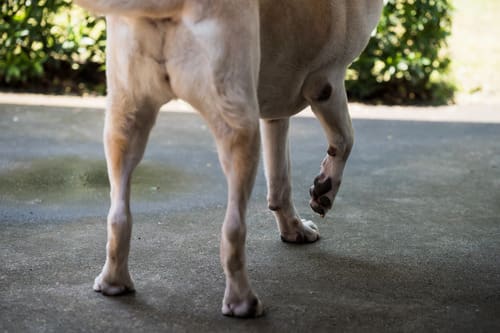If your dog stepped on a bee, their reaction can range from mild discomfort to a more serious allergic response. Just like humans, dogs can have different levels of sensitivity to bee stings, and their paws are particularly vulnerable. A sting can cause immediate pain, swelling, and irritation. While some dogs may recover quickly, others may require veterinary attention if they experience a severe reaction. If your dog is showing signs of distress, contact Rutherford Veterinary Hospital in Dallas, TX, at (214) 826-4166 for guidance.

Recognizing the Signs of a Bee Sting in Dogs
When a dog steps on a bee, the sting injects venom, which can cause an immediate reaction. Some of the most common symptoms include:
- Limping or favoring a paw
- Swelling and redness
- Licking or chewing the paw
- Whining or yelping
- Visible stinger embedded in the skin
- Localized heat due to inflammation
Most mild bee stings cause only temporary discomfort. However, some dogs may experience more severe reactions, requiring veterinary attention.
When to Seek Veterinary Care for a Bee Sting
While many bee stings result in mild discomfort, certain symptoms indicate a more serious reaction. You should contact Rutherford Veterinary Hospital at (214) 826-4166 if your dog shows any of the following:
Signs of an Allergic Reaction
- Difficulty breathing – Swelling near the throat or anaphylactic shock can restrict airflow.
- Excessive swelling – If the paw, leg, or face swells significantly, it may indicate a stronger immune response.
- Hives or skin reactions – Raised, itchy welts appearing beyond the sting site can signal an allergic reaction.
- Vomiting or diarrhea – Digestive distress following a bee sting may be a sign of an allergic response.
- Weakness or collapse – If your dog seems lethargic, dizzy, or collapses, seek emergency care immediately.
Certain breeds, such as brachycephalic (flat-faced) dogs like Bulldogs and Pugs, may have an increased risk of breathing difficulties due to swelling. Additionally, dogs with a history of allergies or prior severe reactions to insect stings may be more vulnerable.
What to Expect at Rutherford Veterinary Hospital
If your dog stepped on a bee and requires veterinary attention, the team at Rutherford Veterinary Hospital will assess their symptoms and provide appropriate care. Treatment options may include:
- Removing the stinger – If still embedded, your veterinarian will safely extract it.
- Managing pain and inflammation – Anti-inflammatory medications or pain relief may be given.
- Antihistamines or steroids – These can help reduce swelling and allergic reactions.
- Monitoring for anaphylaxis – If your dog shows signs of a severe reaction, they may need further observation and supportive care.
If you are unsure about the severity of the sting, seeking professional advice is always the best approach.
How to Protect Your Dog from Bee Stings in the Future
While it’s impossible to eliminate all risks, there are steps you can take to reduce the chances of your dog stepping on a bee.
Be Aware of High-Risk Areas
- Bees are naturally drawn to flowers, making gardens a common hotspot.
- Clovers and ground cover plants attract bees, especially in warm weather.
- Beehives and nests are another hot spot. If you notice a hive near your home, contact a professional to relocate it safely.
Supervise Outdoor Time
- Before letting your dog roam, scan the area for visible bees.
- Open fields or mowed grass are less likely to harbor bees than wildflower patches.
- Avoid peak bee activity times in the warmer parts of the day, especially in spring and summer.
Consider Protective Measures
- Paw wax or booties, while not foolproof, can add a layer of protection for dogs prone to stepping on bees.
- Teaching your dog to come when called can prevent them from lingering in areas where bees are present.
Recognizing When Your Dog Needs Help
If your dog stepped on a bee and is experiencing discomfort, monitoring their symptoms is essential. Most dogs recover quickly from mild stings, but signs of an allergic reaction require immediate attention. Contact Rutherford Veterinary Hospital in Dallas, TX, at (214) 826-4166 if you have concerns about your pet’s reaction. Quick action ensures they receive the best care possible and prevents complications.


 Have an Emergency?
Have an Emergency?